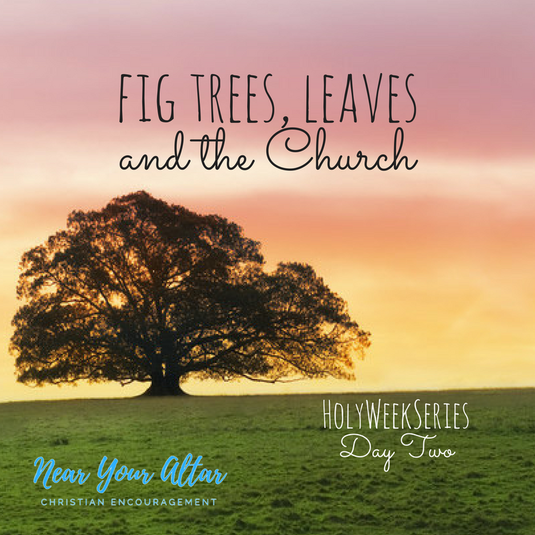 I love Jesus’ relationship with food. Before He came to the earth as a newborn baby, He probably never needed to eat – after all, He is God. He was, is, and ever shall be – and food isn’t exactly a necessity when You are eternal. Still, it seems like Jesus just enjoyed food when His feet walked this earth. His relationship with food also indicates His humanity, for we need food to sustain our lives. So the day after Jesus’ triumphant entry into Jerusalem at the start of Holy Week, we see Jesus and the disciples walking back to the city after staying overnight in Bethany. Scripture says in Matthew 21:18-22 that Jesus saw in the distance a fig tree covered in leaves, and He walked over to check it out. Now, a little about horticulture in Israel – and specifically about figs. Fig trees grow to about 20 feet tall and are quite good for giving shade in addition to edible fruit. The thing about figs that makes them unique is this: they have fruit before they have leaves. Usually. Many tiny flowers are housed within the fruit bud, and the flowers are never seen, that’s how small they are. So, Jesus sees a fig tree in the distance. Scripture says that He was hungry, and no doubt He went up to the fig tree to grab a snack. But, Matthew 21:19 states, He “found nothing on it except leaves.” Now let’s stop here and pose a question that has nothing to do with this particular lesson but is a lesson unto itself. If Jesus is fully God as well as fully man, He would have known there were no figs on the tree. He healed people He didn’t even lay eyes on, yet here He is, looking on the boughs and branches of a tree He created to see if there were any ripe figs ready to be eaten. Who was with Him? The disciples. Did they learn a lesson with the fig tree? Undoubtedly, yes. Do we as the Bride of Christ learn a lesson with the fig tree? Oh yes [more on that in a bit]. Even though the Lord knows everything, He presents situations and circumstances to teach us, to show us His power and glory, or to give us the blessing of a testimony to share with others. The Lord God knows that if we actually learn from the lessons He presents, we will be grow in faith and better equipped to share the results of those lessons with others. Look at 2 Corinthians 1:3-4 – “Praise be to the God and Father of our Lord Jesus Christ, the Father of compassion and the God of all comfort, who comforts us in all our troubles, so that we can comfort those in any trouble with the comfort we ourselves receive from God.” We are not God. God is God. Jesus knew there were no figs on the tree; we are blessed in that we have the Scriptures to see the bigger picture, whereas the disciples did not. When we are perplexed about the things God is bringing us through, we need to take this to heart. Like the disciples, we may not have the bigger picture – but we take comfort in the fact that God is the bigger picture. We have faith that even though we wonder what in the world Jesus is doing in our lives, why are we on the path we’re on – that He knows. That knowledge that Jesus is not just laying the pavers on the path we’re on but knows where the path is going is called faith. Faith is what Jesus was getting at with the fig tree. He went up to search for fruit on a tree that, by botany’s account, should have had figs on it. If we look at this same story in Mark 11:12-14, Mark writes that Jesus “found nothing but leaves, because it was not the season for figs.” Remember, on fig trees, the fruit comes before the leaves. This tree was filled out with beautiful large leaves, glorious in the sunlight and no doubt providing shade for travelers as it was beside the road. It looked great. But it had no fruit. The church in Sardis in Revelation was like that. John wrote Jesus’ words that probably stung and frightened that church: “To the angel of the church in Sardis write: ‘These are the words of him who holds the seven spirits of God and the seven stars. I know your deeds; you have a reputation of being alive, but you are dead. Wake up! Strengthen what remains and is about to die, for I have found your deeds unfinished in the sight of my God. Remember, therefore, what you have received and heard; hold it fast, and repent. But if you do not wake up, I will come like a thief, and you will not know at what time I will come to you.’” [Revelation 3:1-3]. That fig tree had a reputation (leaves) for being laden down with the possibility of fruit. Yet, when Jesus came, the reality was the tree had no fruit at all – it might as well had been dead. Jesus therefore cursed the tree, saying, “’May you never bear fruit again!’ Immediately the tree withered,” [Matthew 21:19b]. This tells us that at one time, that tree bore fruit. But for whatever reason, it stopped being fruit and had leaves just for show – to spread its branches out twenty feet and provide shade but nothing of substance to people who needed both. The Old Testament prophet Daniel was once called in to decipher an inscription written to King Darius by a mysterious, disembodied hand: “This is the inscription that was written: mene, mene, tekel, parsin “Here is what these words mean: Mene: God has numbered the days of your reign and brought it to an end. Tekel: You have been weighed on the scales and found wanting. Peres: Your kingdom is divided and given to the Medes and Persians.” [Daniel 5:25-28]. I imagine you sitting there, reading this and asking yourself, “So what? What does that have to do with fig trees?” Not much. But it has everything to do with the Church. We as the Bride of Christ, the Church, are so preoccupied with leaves – the stuff that makes us look good, the stuff that attracts people to slumber under our branches, cool and comfortable. Programs, social justice issues, buildings, the color of carpeting, logos, mission statements … when did Jesus become a marketable product instead of the Lord God, King of Kings, to be worshiped and shared? Unless the Bride of Christ turns back to her Bridegroom-Redeemer, God is numbering her days. She is even now being weighed on the scales and found wanting. I don’t know about you, but that thought chills me to the bones. Churches, you want to know what your mission is? It doesn’t take a committee to figure it out. “Therefore go and make disciples of all nations, baptizing them in the name of the Father and of the Son and of the Holy Spirit, and teaching them to obey everything I have commanded you. And surely I am with you always, to the very end of the age” – found in the Word of God at Matthew 28:19-20, not in some demographic study, denomination governing book or marketing plan, but in the Bible. Jesus looked up at that fruitless fig tree and cursed it. It immediately withered. Are we, as the Church, withering? What are our priorities? Is it having programs that provide recreation or fun but not a lot of substance in the way of the Gospel message? Is it advocating for social justice issues of which Jesus would have never approved? Is it giving people in the pews what they want to hear instead of what they need to hear? Are we withering instead of experiencing an outpouring of the Holy Spirit so great that it would see millions come to know Christ as Savior? The disciples were stunned at the fig tree and asked, much like every governing body in every church, “How did this happen?” Jesus said in Matthew 21:21-22, “…Truly I tell you, if you have faith and do not doubt, not only can you do what was done to the fig tree, but also you can say to this mountain, ‘Go, throw yourself into the sea,’ and it will be done. If you believe, you will receive whatever you ask for in prayer.” Friends, the post-Resurrection Church of today is withering because we have forgotten Whose we are. We have misplaced our faith from Jesus Christ into our own ability to grow fruit, and instead, just make leaves. Stuff for show. Just like the church in Sardis, we have a reputation for being alive – in the world’s standards – but when it comes to the things of God, we are dead – or dying. Christ, though, as always, gives His Bride a way out. “Wake up!” He shouts in Revelation 3. “Strengthen what remains and is about to die, for I have found your deeds unfinished in the sight of my God!” The Church that has programs and activities and preaches the Word of God is not doomed. The Church that preaches and teaches salvation that is only known in Jesus Christ will reap a bountiful harvest – of figs and leaves. Personally, I find this lesson one to take heart for my own life. I discovered studying these passages that I’ve been fertilizing with the wrong things and gaining leaves – when I should have been in the Word more and, therefore, gaining the Fruit of the Spirit and the joy of Christ’s salvation. I hear Jesus’ urgent plea to the church at Sardis: “Wake up!” much like I say to my kids to get them out of a deep slumber in the comfort of their beds. The Christian life is not meant to be comfortable, all pancake suppers and the coolest VBS décor. The Christian life is all about Jesus: walking with Him, for Him, and in step with Him. May this be our fervent prayer. In His Name, Terrie © 2017 Terrie McKee
0 Comments
Leave a Reply. |
Recent PostsAdvertisingThis post may contain affiliate links to products and/or services, including those available on Amazon.com, as Near Your Altar is a participating member in the Amazon Affiliate Program in addition to other retail affiliates. These affiliate links help provide for this website as well as a small income to my family and I. Please consider clicking on the links to purchase or to browse the affiliate's website, which will open in a new window. We thank you for your support. ~ Terrie
Read Disclosure Policy here |





